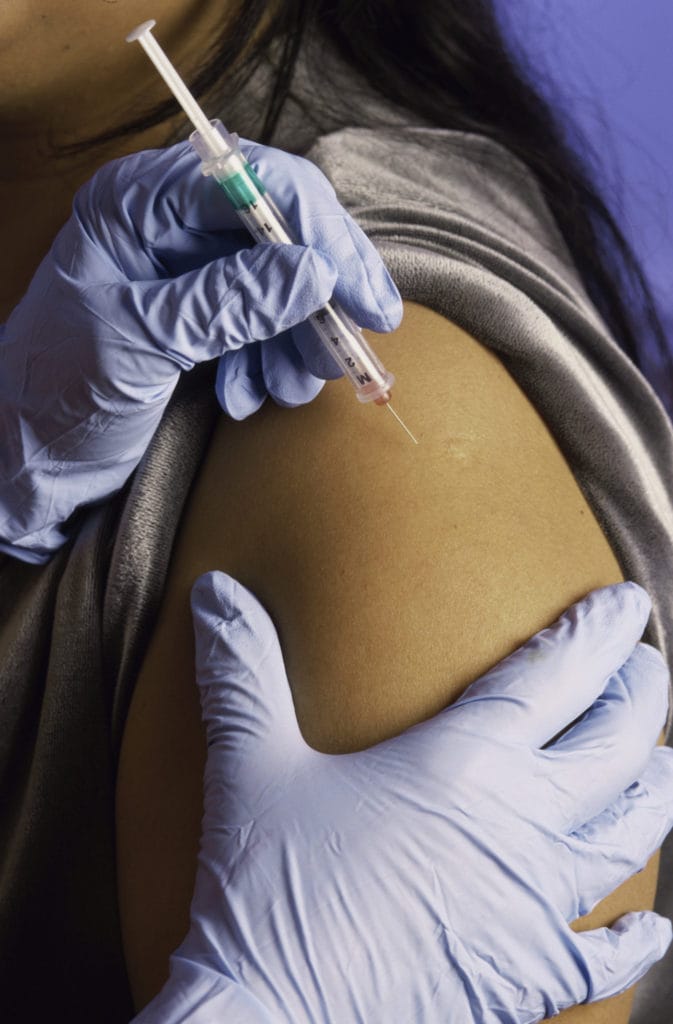Small cash incentives can dramatically increase the likelihood of people who inject drugs completing a course of hepatitis B virus (HBV) vaccination, according to new research led by King’s College London. Hepatitis B is an illness caused by the highly infectious hepatitis B virus. In most people, the disease is acute, with serious symptoms that last for weeks or months. The acute symptoms of hepatitis B include fever, jaundice, abdominal pain, gastrointestinal distress and major fatigue. In some people, the virus results in a chronic infection of the liver that can lead to cirrhosis and liver cancer. Those with chronic hepatitis B are also carriers of the virus and can transmit the virus to other people. Hepatitis B can be transmitted through infected blood, semen, vaginal secretions and the pus from open sores. Sharing needles during drug use is one of the most common ways in which the virus spreads, and an estimated 20 percent of drug users who use needles are infected with hepatitis B. Hepatitis B is significantly more infectious than HIV. There is an effective vaccination process for hepatitis B, but most chronic drug users do not complete the vaccination series. Recently, a study from the United Kingdom investigated whether offering a small cash-equivalent supermarket voucher would encourage more heroin users to be vaccinated against the virus. The study was funded by the National Institute of Health Research in the U.K., and conducted by a large team that included researchers from Imperial College London, King’s College London and University College London as well as various NHS (National Health Service) Foundation trusts. It was published online April 9, 2014 in the journal The Lancet. A total of 210 drug users seeking treatment at 12 NHS drug treatment facilities were enrolled in the study between March 16, 2011, and April 26, 2012. Sixty-seven participants were scheduled to receive hepatitis B vaccinations but were offered no incentives, 78 participants were offered three fixed-value vouchers (£10 each) for each on-time appointment, and 65 were offered three vouchers of escalating value (£5, £10 and £15) for each on-time appointment. The findings showed positive results overall for the incentive program. Of the 67 participants who did not receive any incentive, only six (9 percent) met the primary goal (on-time appearances for each of the three appointments). However, 35 of the 78 participants offered fixed-value vouchers (45 percent) met the primary goal successfully, and 32 of 65 participants offered vouchers of increasing value (49 percent) made each appointment on time. In all, participants offered vouchers to complete the vaccination series were 12 times more likely to do so than those who were offered no incentives. Professor John Strang from the National Addiction Centre at King’s College London led the study. “That monetary incentives increase compliance is unremarkable, but the size of the increase we observed was striking,” Strang said in a statement put out by the university. “Injecting drug users are at high risk of infection and transmission of hepatitis B. This is a potentially life-saving vaccine, and increasing its uptake among this group has important benefits to public health, as well as to the individual.”
Debate Over Vouchers for Drug Users
Some U.K. critics of the study feel that national health care funds should not be used to “bribe” drug users into getting vaccinations. In response, the NHS has argued that money spent on such incentives, given the positive results, is likely to save the government a significant amount of money in the long run. The NHS spends around £375 million per year on treatment services for people infected with hepatitis B. Hepatitis B vaccinations are not the only potential target for NHS vouchers. Another ongoing study funded by the National Institute for Health Research is investigating whether cash vouchers could be effective at helping recovering heroin addicts stay away from the drug. Supermarket vouchers worth £10 are being used in this study at various intervals for recovering addicts who remain successfully sober. The results of this study have not yet be evaluated and published, but the NHS hopes that it could see similarly encouraging results as the hepatitis B study. Like hepatitis B, heroin treatment costs the U.K. government a significant amount of money every year. If a small amount of cash upfront helps people in recovery complete treatment without relapse, it could help to avoid treatment costs down the road for users who fall off the wagon. The NHS points out that heroin use also has societal costs, as addiction cripples personal productivity and self-sufficiency for people who struggle with it. Heroin addiction also increases petty crime and violent crime, creating more victims of this difficult disease.

